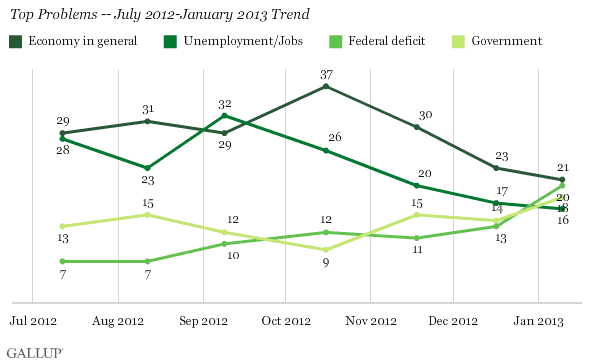PRINCETON, NJ -- Americans' concerns about the federal budget deficit and government dysfunction rose high enough in January to knock unemployment out of the top two slots on Gallup's "most important problem" list for the first time since 2009.
![What do you think is the most important problem facing this country today? [Open-ended] January 2013](http://content.gallup.com/origin/gallupinc/GallupSpaces/Production/Cms/POLL/rs-ejex8fuwaxdbch2zkpg.gif)
These results are based on a Jan. 7-10 Gallup poll, conducted just after Washington lawmakers narrowly avoided the fiscal cliff by virtue of a resolution that in part postponed the deadline for legislated sequestration of spending until March 1. Additionally, a debt ceiling deadline looms within the next two months.
The poll finds 20% of Americans mentioning the federal budget deficit as the top problem, compared with 18% mentioning dissatisfaction with some aspect of government or government leaders, and 16% naming jobs or unemployment.
This distribution of open-ended responses to the "most important problem" question underscores a general shift from the dominance of concerns about the economy and unemployment to an increasing focus on problems more directly associated with government. The economy and unemployment had ranked as the top two problems each month since December 2009.
Now, the "dissatisfaction with government" percentage is as high as it has been since the Watergate days of 1974, although the precise ways in which these open-ended questions have been coded has changed somewhat during that time. The percentage mentioning the deficit as the top problem is as high as it has been since 1996.
The percentage of Americans mentioning unemployment as the top problem, on the other hand, is the lowest since December 2009. As recently as September 2011, 39% mentioned it.

Guns and Gun Control at 4% of Mentions, Same as in December
Four percent of Americans name issues relating to guns and gun control as the nation's top problem, the same as in last month's survey, which came in the immediate aftermath of the mass shootings at an elementary school in Newtown, Conn. Four percent also mention taxes this month, the highest in over two years.
Republicans, Democrats Differ on Nation's Top Problem
Republicans and Democrats have significantly different responses to the "most important problem" question. The biggest difference is in terms of the federal budget deficit, mentioned by 30% of Republicans and Republican-leaning independents, compared with 12% of Democrats and Democratic-leaning independents. Democrats are more likely to mention dissatisfaction with government than are Republicans, and are slightly more likely to mention unemployment.
![What do you think is the most important problem facing this country today? [Open-ended] January 2013](http://content.gallup.com/origin/gallupinc/GallupSpaces/Production/Cms/POLL/ijy4-mgjmue1tdvr6ob8ow.gif)
Bottom Line
The percentage of Americans naming the federal deficit and the way government operates as the top problems facing the country today are higher than they have been since the 1990s and the 1970s, respectively. The percentages mentioning the economy and unemployment, on the other hand, are lower than they have been in several years. These results suggest that average Americans are generally shifting their focus -- from worry about macroeconomic problems to worry about issues associated with the way government works.
These concerns may become even more salient in the weeks ahead. The federal government now faces a situation akin to the one in August 2011 -- with the amount of federal debt projected to exceed the mandated debt ceiling. Congress will soon need to act again to raise the debt ceiling. At about the same time, major cuts in federal spending for defense and domestic programs are scheduled to take place if Congress doesn't act on that front. Republican leaders have stressed that they want to tie spending cuts to any expansion of the debt ceiling, while President Obama has stressed the need to avoid defaulting on obligations at any cost.
These monthly "most important problem" updates don't provide direction from the public on exactly what Americans want their government to do to fix the problems cited. But Gallup's tracking provides clear evidence that Americans' concern about the debt and the way government operates is increasing.
Survey Methods
Results for this Gallup poll are based on telephone interviews conducted Jan. 7-10, 2013, with a random sample of 1,011 adults, aged 18 and older, living in all 50 U.S. states and the District of Columbia.
For results based on the total sample of national adults, one can say with 95% confidence that the maximum margin of sampling error is ±4 percentage points.
Interviews are conducted with respondents on landline telephones and cellular phones, with interviews conducted in Spanish for respondents who are primarily Spanish-speaking. Each sample includes a minimum quota of 500 cellphone respondents and 500 landline respondents per 1,000 national adults, with additional minimum quotas among landline respondents by region. Landline telephone numbers are chosen at random among listed telephone numbers. Cellphone numbers are selected using random-digit-dial methods. Landline respondents are chosen at random within each household on the basis of which member had the most recent birthday.
Samples are weighted by gender, age, race, Hispanic ethnicity, education, region, adults in the household, population density, and phone status (cellphone only/landline only/both, cellphone mostly, and having an unlisted landline number). Demographic weighting targets are based on the March 2012 Current Population Survey figures for the aged 18 and older U.S. population. All reported margins of sampling error include the computed design effects for weighting.
In addition to sampling error, question wording and practical difficulties in conducting surveys can introduce error or bias into the findings of public opinion polls.
View methodology, full question results, and trend data.
For more details on Gallup's polling methodology, visit www.gallup.com.
